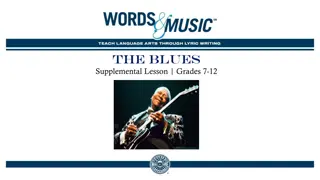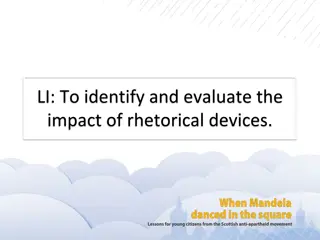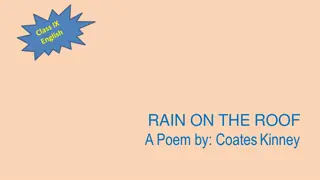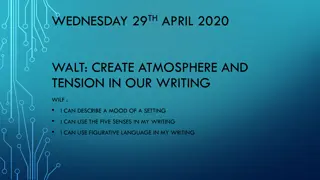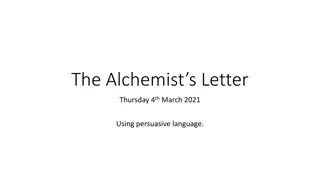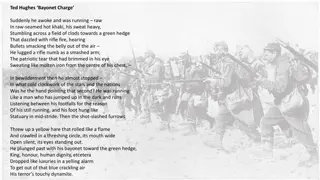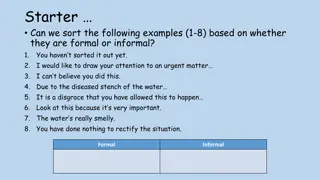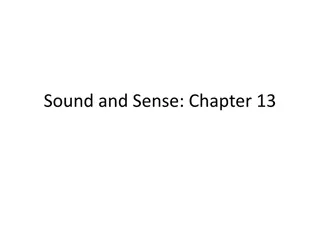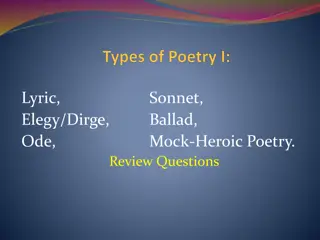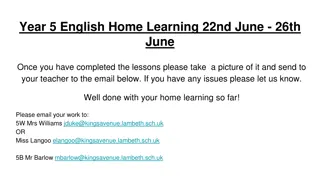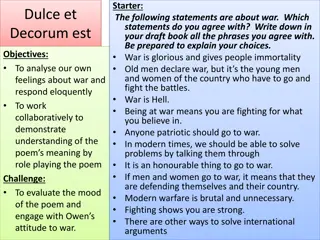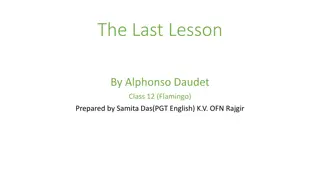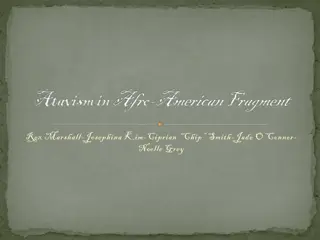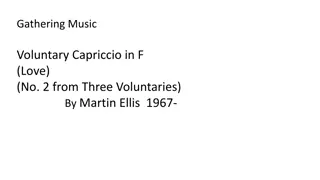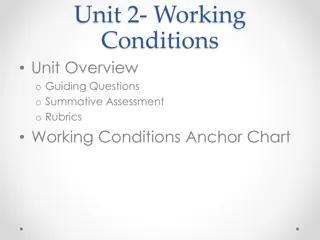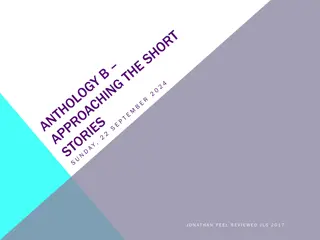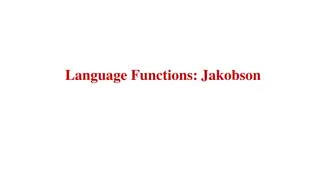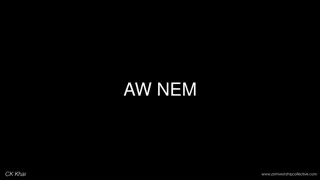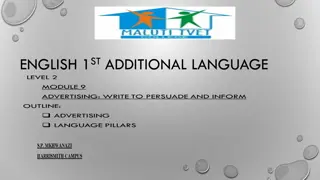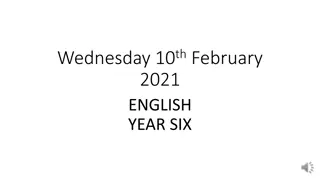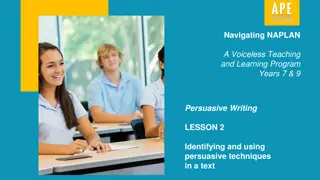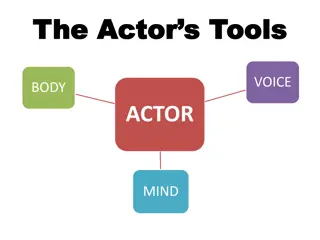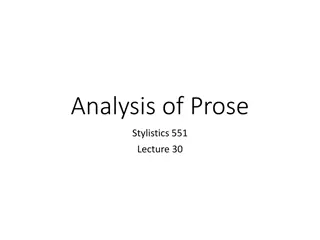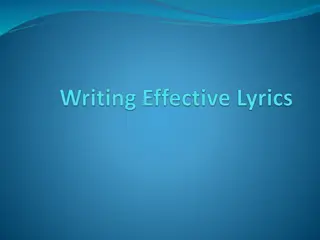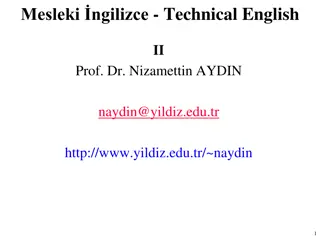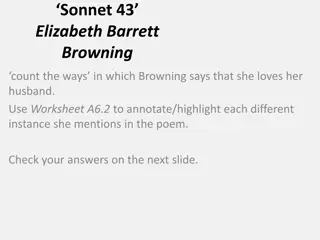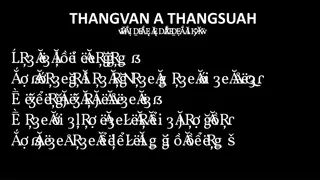Beautiful Journey Through Imagery: Stage 416 Merriment and More
Embark on a visually captivating journey through a series of stunning images capturing the essence of Stage 416. From scenes of merriment and happiness to moments of plentiful beauty, each image tells a unique story. Delve into the world of vivid colors, rich textures, and emotive landscapes that in
0 views • 19 slides
An Exploration of Stylistics in Linguistics: Expressive Means and Stylistic Devices 2. Stylistics as a branch of linguistics examines expressive means and stylistic devices which enhance the emotive and aesthetic qualities of language. These include
Stylistics, Linguistics, Expressive Means, Stylistic Devices, Language
5 views • 25 slides
Exploring the Rich History and Varieties of Blues Music
Delve into the emotive world of blues music, tracing its origins from the Mississippi Delta in the late 1800s to its evolution across the United States. Discover the powerful storytelling within blues songs, the unique styles like Mississippi Delta and Texas Blues, and the artists who crafted this g
1 views • 24 slides
Impact of Rhetorical Devices in Speeches by Malala Yousafzai, Martin Luther King Jr., and Greta Thunberg
The speeches by Malala Yousafzai, Martin Luther King Jr., and Greta Thunberg exemplify the power of rhetorical devices such as rhetorical questions, repetition, emotive language, and direct address. These devices effectively convey their messages and evoke strong emotions, highlighting the importanc
0 views • 11 slides
Appreciating the Healing Power of Rain in "Rain on the Roof" by Coates Kinney
The poem "Rain on the Roof" by Coates Kinney explores the poet's emotional response to the sound of raindrops on his rooftop. It delves into themes of nostalgia, comfort, and the ability of rain to evoke cherished memories, particularly of the poet's mother, offering solace in its soothing rhythm. T
1 views • 15 slides
Eerie Atmosphere: Unveiling Mysterious Settings
Dive into the world of creating atmosphere and tension in writing by exploring the use of descriptive language, figurative expressions, and sensory details. Learn how to craft a mysterious and spooky atmosphere in a story through vivid descriptions and emotive vocabulary, as exemplified in a deserte
0 views • 6 slides
Analyzing Rhetorical Devices in Super Bowl Ads
Explore the use of rhetorical devices such as rhetorical questions, emotive language, parallel structures, and more in the context of Super Bowl advertisements. Students will learn to identify and analyze these devices to understand their impact on the effectiveness of advertising messages.
0 views • 42 slides
Understanding the Power of Persuasive Language in "The Alchemist's Letter
Explore the art of persuasion through persuasive language techniques like repetition, emotive language, exaggeration, and rhetorical questions as used in "The Alchemist's Letter." Delve into how Nicholas tries to persuade his son using these methods to prevent past mistakes from recurring.
0 views • 14 slides
Understanding the Power of Language: Influence and Perception
Language is a multifaceted tool that serves various functions, from communication to influencing others. It shapes our worldview through emotive language, rhetorical devices, euphemisms, and dysphemisms. Politicians use euphemisms like "enhanced interrogation" to mask harsh truths. Euphemisms can le
0 views • 16 slides
Analysis of Ted Hughes' Poem "Bayonet Charge
The poem "Bayonet Charge" by Ted Hughes delves into the chaotic and harrowing experience of a soldier in the midst of battle. The vivid imagery, use of similes and rhetorical questions highlight the confusion, fear, and sense of insignificance felt by the soldier as he navigates the brutal realities
0 views • 11 slides
Analyzing Language and Persuasion Strategies in Waste Management Education
Explore the use of emotive language in persuading actions for waste management. Learn to identify formal and informal language examples and create persuasive sentences. Also, spot and correct spelling errors while discussing impactful slogans. Engage in activities to enhance understanding and commun
0 views • 16 slides
Exploring Sound Associations in Language
Delve into the fascinating world of onomatopoeic words, phonetic intensives, and associations between sound and meaning in language. Discover how words like "hiss," "snap," and "bang" mimic their sounds, and how sounds like "fl-" relate to moving light. Explore the connections between sounds and the
0 views • 15 slides
Understanding Different Forms of Poetry
Explore the characteristics of different types of poetry such as lyric, elegy/dirge, ode, sonnet, ballad, and mock-heroic poetry. Delve into the personal feelings expressed in lyric poems and the structured beauty of sonnets. Discover the emotive power of elegies and the celebratory nature of odes.
2 views • 15 slides
Understanding the Impact of War through Alfred's Eyes
Exploring the emotional depth of Alfred's experience during war, from initial feelings of normalcy to the growing horror and trauma. The narrative unfolds with powerful imagery and emotive language, revealing Alfred's struggles and the haunting effects of conflict on his mental state. Through detail
2 views • 26 slides
Year 5 English Home Learning - 22nd June to 26th June
This week's English home learning for Year 5 students involves understanding symbolism, exploring emotive language, developing empathy, and using drama to delve into character thoughts and feelings. Lessons include defining symbolism, identifying examples, discussing color symbolism, and analyzing t
0 views • 21 slides
Historic Speech Excerpts Reflecting Rhetorical Techniques
Excerpts from speeches by Martin Luther King Jr., Barack Obama, and Ben Bernanke showcase the use of ethos, pathos, and logos in persuasive communication. Each speaker employs different rhetorical strategies to convey their messages effectively. King's emotive appeal, Obama's strategy of outlining s
0 views • 13 slides
Exploring Wilfred Owen's Poem Dulce et Decorum Est
Dive into the powerful anti-war poem "Dulce et Decorum Est" by Wilfred Owen, examining the harsh realities of war through vivid imagery and emotive language. Explore the poet's disdain for the glorification of war and the impact it has on soldiers. Through analysis and role-playing, uncover Owen's p
0 views • 9 slides
The Last Lesson - Alphonse Daudet's Emotive Tale of Transition
Alphonse Daudet's poignant narrative "The Last Lesson" portrays the impact of language imposition during the Franco-Prussian War. The story unfolds in Alsace and Lorraine, annexed by Prussia, as M. Hamel announces the end of French teaching, evoking remorse and newfound appreciation from the student
0 views • 10 slides
Exploration of Atavism in "Afro American Fragment" and its Connection to Jack London's Works
The analysis delves into the theme of yearning for a lost past in the poem "Afro American Fragment" by exploring figurative language, imagery, sound devices, mood, and tone. It draws parallels between the concept of Atavism in the poem and its resemblance to Jack London's stories like "The Call of t
0 views • 8 slides
Inspirational Collection of Church Music Compositions
Explore a diverse selection of church music compositions including a voluntary capriccio, morning fanfare, dorian interlude, and a postlude based on the biblical story of Joshua. These pieces, written by talented composers from different eras, promise to elevate your worship experience with their em
0 views • 4 slides
Insights into Challenging Working Conditions Across Different Industries
The provided excerpts shed light on the harsh working conditions faced by individuals in various settings, ranging from textile mills to modern farm technology. The emotive descriptions depict the physical and emotional toll of long hours, hazardous surroundings, and exploitation. The contrast betwe
0 views • 8 slides
Exploring Writing Styles in Short Stories: Key Features and Approaches
This content delves into the nuances of analyzing and understanding short stories, emphasizing the key features such as writer's perspective, language use, and narrative structure. It offers guidance on approaching short stories systematically, using frameworks like SLIME or SCASI. Additionally, it
0 views • 16 slides
Understanding Roman Jakobson's Six Language Functions
Roman Jakobson, a prominent linguist, defined six functions of language, each associated with a specific factor. These functions include referential, poetic, emotive, conative, phatic, and metalingual functions. Through his work, Jakobson emphasized the various aspects of communication and how langu
0 views • 12 slides
Zomi Worship Collective - AW.NEMCK.Khai
The Zomi Worship Collective presents AW.NEMCK.Khai, a soulful song that speaks of divine connection and gratitude. The powerful chorus reverberates with the message of faith and praise, inviting listeners to join in worship and reflection. With emotive verses and stirring melodies, this song uplifts
0 views • 9 slides
Understanding Different Types of Advertisements and Their Impact
Emotive language in advertising involves the deliberate choice of words to evoke emotions and influence consumers. Different types of advertisements like display ads, classified ads, posters, pamphlets, and notices aim to attract attention and persuade consumers. Each type serves a specific purpose
0 views • 8 slides
Engaging Narrative Writing Challenges for Year Six Students
Delve into a captivating narrative featuring Louisa, Miss Larkin, and Mr. Spencer. Explore the use of figurative language, relative clauses, and emotive language in a mysterious and dramatic setting. Follow the challenges outlined to enhance your storytelling skills with similes, personification, me
0 views • 6 slides
Mastering Persuasive Writing Techniques for NAPLAN Success
Learn how to identify and apply persuasive writing devices such as emotive language, rhetorical questions, superlative adjectives, and generalizations in your writing to effectively sway your audience. Enhance your persuasive skills and excel in your NAPLAN assessments with these powerful techniques
0 views • 44 slides
Engaging Daily Learning Activities for Year 6 - 13th January 2021
Dive into a range of educational activities for Year 6 students, including spelling exercises, punctuation practice, reading comprehension, guided reading tasks, and creative writing prompts. Encourage self-expression and emotive reflection while exploring new vocabulary and enhancing writing skills
0 views • 18 slides
Enhance Your Acting Skills with "The Actor's Tools
Discover the key elements essential for actors - Voice, Body, Mind, Flexibility, Energy, Control of Movement, Projection, Articulation, Inflection, Vocal Variety, Imagination, Creativity, Emotion, Knowledge, and Memory. Each component plays a vital role in shaping a versatile and emotive performer.
0 views • 4 slides
Understanding Stylistic Analysis in Literature
Stylistic analysis in literature involves examining linguistic features like lexis, grammar, foregrounded elements, and context to distinguish between literary and non-literary prose. While poetry allows for whole text analysis due to its brevity, prose analysis often focuses on selected extracts fo
0 views • 16 slides
Crafting Great Song Ideas: Unleashing Creativity in Music Composition
Delve into the art of generating compelling song concepts, tapping into universal themes like love or aspirations. Explore the power of personal stories, unique phrases, and potent titles to captivate audiences. Discover techniques for maintaining inspiration, shaping catchy hooks, and portraying si
0 views • 13 slides
Computer Facial Animation: Exploring Techniques and Applications
Explore the world of computer facial animation with a focus on basic vocabulary, 3D-animation systems, and speech animation challenges. Discover key concepts like morphing, rendering, keyframes, texture, computer vision, alignment, and motion capture. Engage in pre-reading questions to understand th
0 views • 45 slides
Analyzing Sonnet 43 by Elizabeth Barrett Browning
Explore the depth of love expressed in Sonnet 43 by Elizabeth Barrett Browning through an annotation and analysis of each instance she mentions how she loves her husband. Discover the intense emotions and emotive language presented in the poem, highlighting the cadences of expression and the freedom
0 views • 4 slides
THANGVAN.A.THANGSUAH - Captivating Collections of Cultural Artistry
Delve into the mesmerizing world of THANGVAN.A.THANGSUAH, where traditional art meets contemporary expression in a harmonious blend of colors and stories. The collection showcases the rich heritage and cultural essence of the artist, inviting viewers on a visual journey filled with depth and vibranc
0 views • 8 slides


